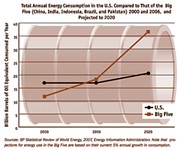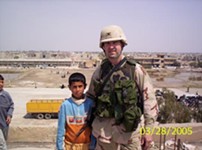Freeport Meets Its Critics
EnvironsCompany Vows to `Hunker Down and Go'
By Robert Bryce, Fri., May 15, 1998
|
|
Kolbenschlag, a member of the Sisters of Humility of Mary, an order with 300 members and an investment portfolio worth "tens of millions of dollars," says her group is compelled to protest the company's operations because, she said, "We feel Freeport is one of the transnational companies that is one of the greatest offenders in terms of degradation of an environment, but even more so, the dissolution of an indigenous people."
While the Monday meeting at the Radisson Hotel focused almost exclusively on the mine and its effect on people, the Tuesday shareholder meeting - held under extraordinarily heavy security (metal detectors, eight uniformed armed guards, and half a dozen plainclothes security with walkie talkies) at Freeport's headquarters on Poydras Street across from the Superdome - focused almost exclusively on economics.
Although gold and copper prices have plummeted over the past year, Freeport has launched a plan christened "Hunker Down and Go" which calls for increasing production and reducing costs. Under this program, Freeport says it will be the lowest cost copper producer on earth. This year, the company estimates it will be able to mine a pound of copper for 18 cents, down four cents from 1997.
The company recently got approval from the Indonesian government to increase its production to 300,000 tons of ore per day. The report on the expansion, called an AMDAL, estimates that the production jump will increase the size of the area impacted by tailings from the mine. A January 1996 story in the New Orleans Times-Picayune estimated that the tailings being dumped into the river below the mine have "caused flooding that has destroyed 15.4 square miles of rain forest." According to page 38 of the AMDAL executive summary (a copy of which was obtained by the Chronicle), Freeport estimates that under the 300,000-ton expansion, a total of 88 square miles of land will be inundated with the gray, sand-like tailings. The company's video presentation did not discuss the tailings disposal area.
After the company's presentation, Harold J. Mathis, a shareholder from the Houston area who owns nearly half a million dollars worth of Freeport stock, introduced a shareholder resolution that would have required the company to elect its directors annually. At present, the directors serve staggered multi-year terms. Mathis was critical of the company's board structure, saying that it was not responsive to shareholders, and that boardmembers continued to receive lucrative salaries last year at a time when the company was cutting dividends and share prices had fallen by half. "Your shareholders have been hunkering down. Now we are ready to go," said Mathis. After the meeting, Mathis said the board contains too many consultants and that they are more beholden to Moffett than to shareholders. The consultants on the board include former Secretary of State Henry Kissinger, who earns $200,000 a year according to the company's proxy statement, and former U.S. Senator J. Bennett Johnston, who earns $150,000 a year. Another board member, George Mealey, receives $630,000 in consulting fees.
Questions From the Floor
The Freeport board of directors voted unanimously to oppose Mathis' resolution, which failed after gaining the support of 28% of the shareholders. After Mathis' presentation, Moffett took questions from the 40 or 50 shareholders in attendance. This reporter asked about the $254 million loan guarantee the company gave to PT Nusamba, an Indonesian company controlled by Indonesian ruler Suharto, that allowed Nusamba to buy a 4.7% stake in the Freeport mine. Moffett promised to respond in writing. At press time, Moffett had not responded.
Another questioner, Michelle Chan of Friends of the Earth, asked about the pending human rights lawsuits filed against the company by tribal members in Irian Jaya, and why the suits were not mentioned in the company's annual report. (One suit, filed in state district court by Yosepha Alomang, an Amungme woman who was tortured for a month by Indonesian soldiers, was reinstated recently by an appeals court. Freeport has appealed the reinstatement to the Louisiana Supreme Court. A similar, federal court case was recently dismissed. The plaintiff, Tom Beanal, an Amungme tribal leader, has appealed the dismissal.) Moffett responded that though the company has spent some $2 million fighting the suits, they consider them "frivolous" and therefore they would not have any effect on the company's financial performance. A representative from the accounting firm Arthur Andersen then came to the microphone to corroborate Moffett's statement. While not listed in the annual report, which is distributed to shareholders, the lawsuits are mentioned in the company's 10-k filing to the Securities and Exchange Commission.
If there was a tone of civility to the meeting, it was lost when Danny Kennedy, the loquacious and often sarcastic head of Project Underground, a Berkeley-based activist organization, went to the microphone and launched a personal attack on Moffett, demanding that he resign. Predictably, Moffett responded by attacking Kennedy and a report that Kennedy's group published about the Freeport mine, called "Risky Business." Moffett said the report, which focuses on human rights and environmental problems at the mine, "borders on slander," though he didn't provide any evidence to back up his claim. A few moments later, Moffett also opined that articles written by this reporter were slanderous. Again, he did not provide examples.
Steven Feld, a former professor of anthropology at the University of Texas who will begin teaching at New York University in the fall, asked Moffett about a story in the Far Eastern Economic Review which said that Freeport has spent $35 million for a military barracks for the Indonesian military. Over the past three years, the Indonesian military has been accused of dozens of cases of human rights abuses in the region in and around the Freeport mine. Another report is scheduled to be released soon that details additional abuses, including more than 20 murders by the military in an area 60 miles east of the Freeport mine. Some 600 Indonesian soldiers and 600 Indonesian police are now stationed in Timika, a town of about 60,000 that lies below the mine. Moffett did not dispute the $35 million figure for the military garrison. Instead, he told Feld that Freeport has a responsibility to provide infrastructure in the region, and also has to help "maintain law and order."
Moffett appeared most unnerved by comments from Sister Barbara Aires, a Catholic nun from Houston who is with the Sisters of the Incarnate Word. Aires scolded Moffett from the microphone, saying that the company had not sufficiently changed its stance toward critics and that the structure of the meeting was still too rigid to allow for an open discussion of the problems at the Grasberg mine. Aires - who like Kolbenschlag and the Mennonites is a member of the Interfaith Center for Corporate Responsibility - did not wait at the microphone to engage Moffett. Instead she walked slowly to the back of the room and sat down.
The two meetings did little to resolve the ongoing controversy over the Grasberg mine, which contains the world's largest known gold deposit. Indeed, they occurred at a time when controversy over Indonesia, and over American support for Suharto's regime, appears to be growing. Last week, an Indonesian student who was recently released after being tortured for two months by the Indonesian military testified before a U.S. House subcommittee about human rights conditions in his country. Riots are continuing in universities across the Indonesian archipelago, and Congress continues to debate the $40 billion bailout of the Indonesian economy by the International Monetary Fund.
Regardless of what happens with the IMF bailout and the Indonesian crisis, the activists say they will return in 1999. "There's no question we are going back," says David E. Ortman, a member of the delegation from the Seattle Mennonite Church. "The Mennonite and Catholic churches have been around for hundreds of years. We have far more staying power than Freeport does."
For more info, go to Freeport's website, http://www.fcx.com. The most comprehensive site on the Freeport mine is run by UT professor Robert S. Boyer: http://www.cs.utexas.edu/users/boyer/fp/
Got something to say on the subject? Send a letter to the editor.









